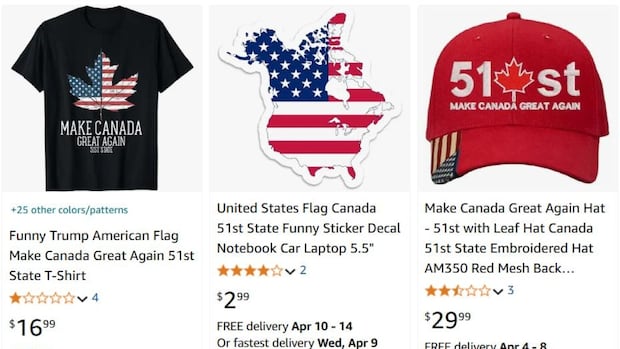U.S. President Donald Trump’s threats to turn Canada into the 51st state have hit the virtual shelves of online retail giant Amazon — and fed-up Canadians are calling for the company to shut it down.
A petition is urging Amazon to disable listings of shirts, hats, stickers and other products emblazoned with quotes referring to Canada as the 51st state or otherwise celebrating the idea of Canada being annexed by its southern neighbour.
“This is not a joke to us. It’s a threat to our autonomy and identity as Canadians,” Ontario resident Sue Williams-Dunn, who started the petition in February, wrote in its description.
The petition had more than 57,000 signatures as of Tuesday afternoon.
A quick search of “51st state” on Amazon’s website brings up a flood of items, including t-shirts that say “Make Canada Great Again” in a reference to Trump’s slogan, stickers of the map of Canada coloured in with the American flag and hats declaring Canada as “the 51st state of America.”
“This is offensive and foments dissent and war. I will immediately not buy products from Amazon,” one commenter wrote underneath the petition.

The emergence of products cheering for the U.S. to take over Canada is just the latest front in the ongoing trade war between the two countries, a bitter back-and-forth of tariffs and counter-tariffs that has sparked many Canadians to embrace a “buy Canadian” sentiment.
Amazon said in an email to CBC News that the products in question did not breach their policies.
The company directed CBC News to its “Offensive Products Policies” page, which states that the company’s policies “prohibit the sale of products that promote, incite, or glorify hatred, violence, racial, sexual, or religious intolerance or promote organizations with such views, as well as listings that graphically portray violence or victims of violence.”
According to the company’s website, a dedicated team monitors complaints and assess potentially offensive products.
“We strive to maximize selection for all customers, even if we don’t agree with the message or sentiment of all of the products,” Amazon’s website states.
Williams-Dunn, a retired registered nurse, told CBC News that she was “so shocked and upset” when she first saw one of the products on Amazon’s website.
“I felt a jolt right through my heart,” she wrote in an email. “Amazon says it does not [contravene] their controversial product policy but I beg to differ!”
Brand blowback?
It’s not a surprise to Daniel Tsai, an adjunct professor of law and business at the University of Toronto and Toronto Metropolitan University, that Amazon would be selling these kinds of products.
“Amazon loves money,” he told CBC News.
“I’m not surprised that there’s an abundance of controversial and inflammatory type of merchandise because Amazon’s whole profit model is based on trying to carry as much merchandise as they can, without regard to the politics of it.”
The National Envelope went to Saint John this weekend, where U.S. President Donald Trump’s threats are weighing heavily in this election.
It’s not all anti-Canadian — the retail giant also currently hosts a number of products that push back against “51st state” rhetoric in its online marketplace, such as hats that say, “Canada is not for sale.”
“They’re selling on both sides,” said David Amos, who teaches retail and marketing courses at the Capilano University School of Business, in B.C.
Amazon isn’t the only site where these products are cropping up: sites like Redbubble and Etsy have similar listings, although products supporting Canada appear to outnumber those celebrating the 51st state rhetoric on these sites.
The fact that Amazon is permitting the sale of products calling for Canada’s annexation could damage its brand image among Canadians, Tsai said — particularly in light of recent accusations that Amazon is engaging in union-busting by ordering the closure of seven warehouses in Quebec, including Canada’s first unionized Amazon facility.
“This reveals Amazon’s true colours as a big American company that just doesn’t care about Canadians,” he said.
But while this could sour some Canadians on the company, for customers who have long relied on Amazon, “it’s hard to find a substitute,” for the retail juggernaut, Amos told CBC News.
“I don’t really see it making that much of a dent.”
Impacts of public outcry
Williams-Dunn said her goal is for the petition to reach one million signatures — she’s hoping that might spur Amazon into action.
Although it’s rare, Amazon has pulled listings due to public backlash before. A number of neo-Nazi and white supremacist products were removed from the site in 2018 and 2020 after criticism from advocacy groups and lawmakers.
The “Buy Canadian” movement is alive and well in the city. But it’s not just Canadians who are refusing to purchase American goods or visit the country. Movements in Europe have cropped up as well.
But Tsai said it’s money that really talks.
“It’s not entirely impossible to force Amazon to remove merchandise, but it normally is extremely difficult to do so,” he said.
“The only way that this petition would be successful is if they actually see that sales go down and that hurts their bottom line. And unless Amazon sees a financial hit, they don’t have much of an incentive to do anything about it.”


